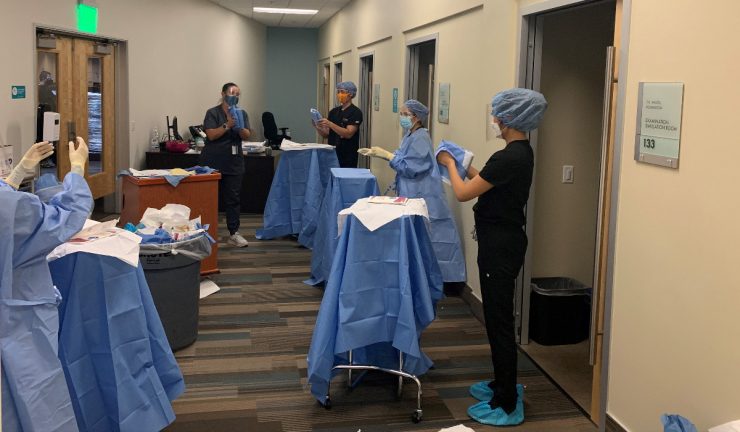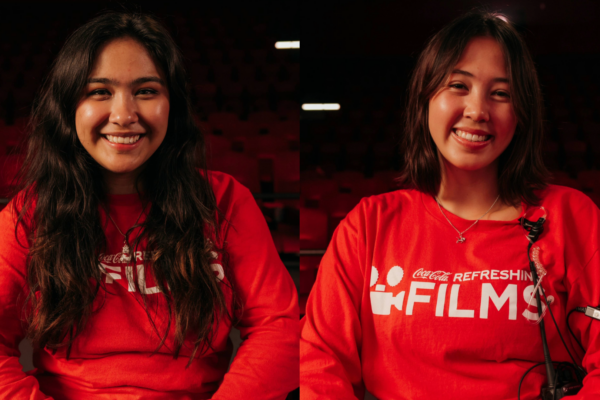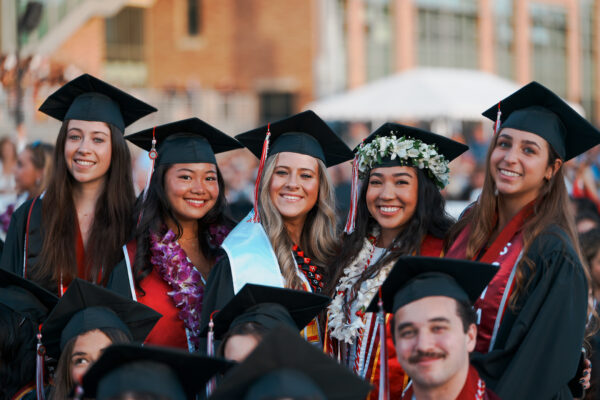When it comes to those strict COVID-19 protocols – yes, even right down to which is the approved door for building entry – Chapman University physician assistant student Emily Blair has no complaints.
Because those are the practices that help create a safe campus and ensure that Blair (’21 MMS) and her fellow classmates in Chapman’s Master of Medical Sciences (MMS) PA Studies Program graduate on time.
“Once our third trimester began, we were allowed to come on campus, with proper screenings and strict protocol in place, to participate in hands-on labs. We have been able to keep up with the scheduled material as well as receive the hands-on experience required of us before going into our clinical year,” Blair said.
Thriving With Virtual and In-Person Classes
That’s just one example of how Chapman forged ahead with a productive and healthy fall semester across campus, despite the COVID-19 pandemic. With a multi-million dollar investment in enhanced technology and physical spaces, the university was able to continue to provide students with a distinctive learning experience, says Chapman Provost Glenn Pfeiffer, Ph.D.
“I’m so proud of how our faculty, staff and students united this semester to make our in-person and remote instruction a success. With technology investments and training, our faculty skillfully delivered a dynamic online educational experience. Our on-campus community modeled the best practices for safe in-person instruction, establishing a culture of caring so important for a fuller return to campus when that is permissible,” Pfeiffer said.
While Orange County health authorities returned Orange County to high-risk status on Nov. 16, necessitating mostly virtual instruction, the fall experience set a solid track record for the university to build on, Pfeiffer added.
“The COVID-19 crisis will continue to evolve, but I am optimistic that the positive experiences of the fall semester will serve us well as we plan for a spring semester of excellence and distinction,” he said.
University Responds to Pandemic Challenge
Some of the university’s comprehensive efforts this fall included:
- $1.9 million investment in classroom technology upgrades to support remote instruction
- $1.2 million for modifications to facilities and cleaning procedures
- $600,000 for personal protective equipment
- Access to COVID-19 testing
- Single-occupancy accommodations in campus housing and packaged to-go meals
- Shaded outdoor study areas equipped with Wi-Fi
- A reservation system for private study rooms in Leatherby Libraries
Because of the nature of the work, the university crafted strategies for some courses that especially benefited from in-person instruction. For example, at Chapman’s Keck Center for Science and Engineering, small groups of chemistry students enjoyed a mix of in-person lab work and remote instruction.
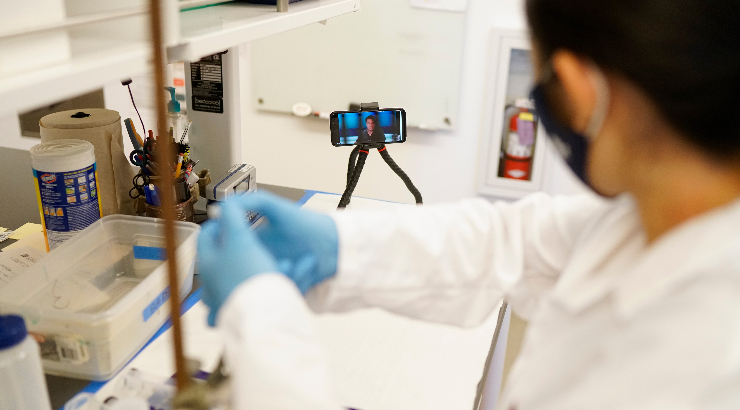
A chemistry student performs lab work as chemistry professor Chris Kim, Ph.D., provides mentorship and supervision through a mounted phone, tripod and body camera.
This hybrid model allowed students to be in the lab, under the live-but-remote supervision of their professor, Chris Kim, Ph.D., professor of chemistry and the principal investigator who leads the KEG Lab, an environmental geochemistry project at Chapman.
Dance students in the College of Performing Arts kept dancing – but in small groups spread across campus, including outdoor basketball and tennis courts across from the Partridge Dance Center.
Like their colleagues in the PA program, students in Chapman University School of Pharmacy were also able to stay on track in their pharmacy degree program thanks to small groups and adherence to protocols. Instruction on the use of diabetic equipment such as insulin pens or administration of the opioid antidote Naloxone can only be in-person, said Kathleen Hill-Besinque, Pharm.D., professor, director of Experiential Education, Department of Pharmacy Practice.
Focused Efforts on Health Care Programs
In addition, preparing pharmacy students for state licensing is especially vital, because pharmacists will be like ground troops in the upcoming COVID-19 vaccine campaign, Hill-Besinque says.
“If we get this vaccine rolled out, you have to have a workforce to administer the vaccinations. Right now, pharmacies are doing a huge number of vaccines because it’s really very difficult for many people to get into another health care provider. Pharmacies are really set up to do the immunizations, everything from the flu shot to Shingrix, the anti-shingles vaccine,” she said.
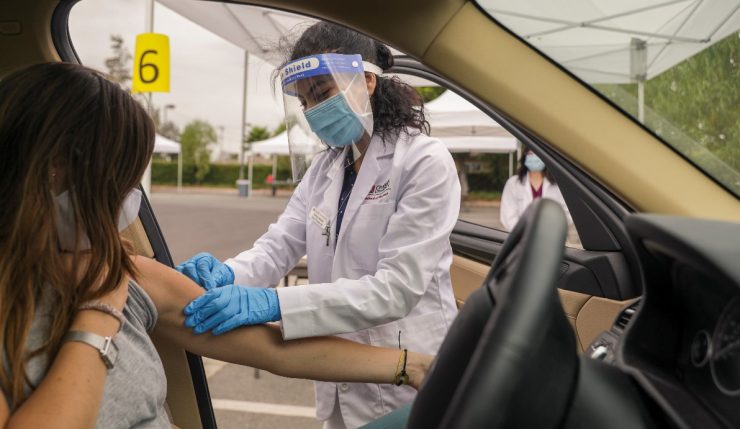
A Chapman University Pharm.D. student administers a seasonal flu shot at one of several drive-through immunization clinics hosted by Chapman.
Staying Resilient During COVID-19
Though everyone eagerly awaits the day when COVID-19 restrictions and challenges are a thing of the past, they have instilled some unique lessons, says Blair. As she looks forward to starting her clinical PA rounds in the New Year, she’s sure of one thing – she and her cohorts already earned a few resiliency stripes.
“While it has been an ever-evolving year, we have fortunately come out the other side successfully,” she says. “As tough as it has been, this year has shown us what we are capable of as a program, and how we as students can be flexible, hardworking, and resilient PAs one day.”
Learn More
To learn more about ways the university is supporting students and providing resources they need for a meaningful educational experience, visit the CU Safely Back Fund page.
